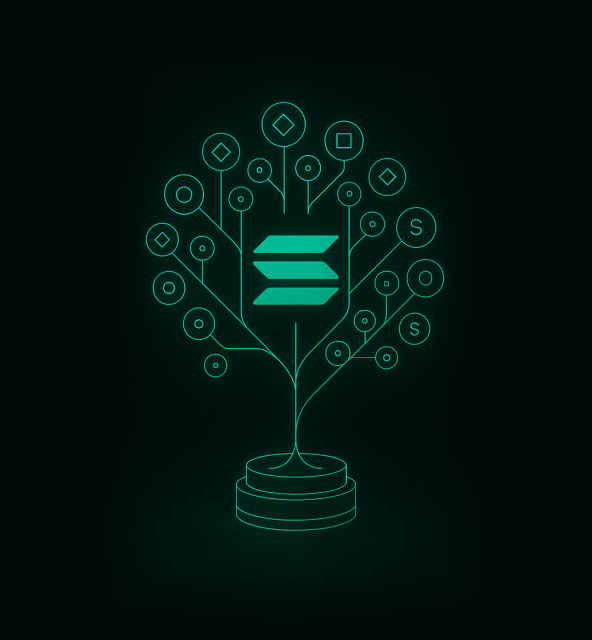Guides
Solana Staking Ecosystem: A Complete Guide to Wallets, Validators, Protocols & More
The Solana staking ecosystem is a dynamic network of tools, protocols, and participants that support secure, decentralized staking. With a high staking rate, it empowers users to optimize rewards through informed validator choices and liquid staking options.

Estimated Read Time: 9 minutes
The Solana staking ecosystem represents a comprehensive network of interconnected tools, protocols, and participants that enable secure, decentralized staking.
With 68% of SOL currently staked (significantly higher than Ethereum's 31%), understanding how these components work together is crucial for anyone looking to optimize their delegation strategy and maximize their staking rewards. Whether you're a first-time staker confused by validator selection or an experienced participant exploring liquid staking protocols, this guide will help you navigate the ecosystem with confidence and make decisions that align with your investment goals.
What you'll learn:
- How wallets enable staking, management, and governance participation
- Key factors for selecting the right validator for your delegation
- Benefits of liquid staking protocols and DeFi integration opportunities
- Ways to participate in Solana governance through the staking ecosystem
- Where Starke Finance fits within the broader staking landscape
What Is the Solana Staking Ecosystem?
The Solana staking ecosystem functions as an interconnected network of tools, protocols, and participants that collectively enable secure, decentralized staking while empowering users with choice and flexibility. This ecosystem includes everything from user-facing wallets to validator infrastructure, liquid staking protocols, and governance mechanisms that allow SOL holders to participate in network security and earn rewards.
The importance of a robust staking ecosystem extends beyond individual rewards. With 68% of SOL currently staked (significantly higher than Ethereum's 31%), the ecosystem's health directly impacts network security and decentralization. A well-distributed stake among reputable participants makes it economically unfeasible for malicious actors to accumulate sufficient stake to manipulate consensus, creating a virtuous cycle where network security attracts more users.
The ecosystem's strength lies in its diversity of options, allowing users to choose solutions that match their technical expertise, risk tolerance, and participation preferences while maintaining the underlying security model that protects the network.
Wallets: Your Gateway to Staking
Solana-compatible wallets serve as the primary connection between users and the staking ecosystem. They provide the tools needed for managing stakes and choosing validators. They also let users track rewards. Not every wallet supports staking, so selecting the right one is essential for anyone who wants to stake.
Good staking wallets offer clear interfaces that make delegation simple. They include validator selection tools with performance data. They also have strong security to protect private keys and allow participation in governance. For example, Phantom is known for its ease of use, Solflare offers broad staking features, and Ledger gives the option of hardware-based security.
Wallets also manage stake accounts. This lets users create separate accounts for delegating to different validators. They handle withdrawals during the cooling-off period. Many also integrate with liquid staking protocols for greater flexibility.
Validator Selection: Securing the Network
The validator selection process represents one of the most critical decisions in the staking ecosystem, as it directly impacts both individual rewards and network security. Users delegate SOL to validators, who help secure the network through consensus participation; validator performance directly affects staking returns.
When selecting a validator, it's essential to consider key performance metrics, including uptime and voting accuracy. Commission rates affect how much you actually earn. A validator's role in decentralization also matters, including its location and operational details. Reliability is another factor, shown by consistent performance and active community engagement. Well-managed validators tend to generate higher rewards because they minimize downtime, vote promptly, and participate accurately in consensus.
The Solana ecosystem has many types of validators. Some are ecosystem teams like Helius that support their core projects. Others are centralized exchanges that offer built-in staking. There are also institutional providers serving enterprise clients and independent teams that add to decentralization.
Starke Finance operates as a user-focused validator and managed staking provider within this landscape, offering institutional-grade infrastructure with advanced features to optimize staking strategies. By providing both direct validation services and sophisticated staking management tools, Starke Finance helps users navigate validator selection while contributing to network security and decentralization.
Liquid Staking Protocols: Flexibility and DeFi Access
Liquid staking protocols revolutionize the staking experience by issuing Liquid Staking Tokens (LSTs) that represent ownership of underlying stake accounts. These tokens enable capital efficiency by unlocking DeFi opportunities while maintaining staking rewards, addressing the traditional trade-off between earning staking yields and maintaining liquidity.
LSTs function as yield-bearing assets that appreciate relative to SOL over time. While native staking increases the balance of staked SOL each epoch, liquid staking maintains a fixed token quantity with appreciating value. This mechanism enables users to deposit LSTs as collateral on lending platforms, participate in automated market makers, and access other DeFi protocols while continuing to earn staking rewards.
Leading Solana Liquid Staking Protocols
| Protocol | Token | Market Share | Total SOL Staked | Key Features |
|---|---|---|---|---|
| Jito | JitoSOL | 24.83% | 15.08M SOL | MEV rewards, high-performance validators |
| Binance | bnSOL | 19.16% | 11.64M SOL | Centralized custodial LST, limited DeFi utility |
| DoubleZero | dzSOL | 13.41% | 8.14M SOL | Stake pool created to incentivize adoption of DoubleZero's private network |
| Jupiter | JupSOL | 8.36% | 5.07M SOL | Integrated with the Jupiter ecosystem, yield optimization |
| Marinade | mSOL | 7.16% | 4.35M SOL | Decentralized validator selection, auto-compounding |
| Starke Finance | rkSOL | 0.12% | 0.08M SOL | Institutional-grade staking token |
Source: Blockworks (As of October 12, 2025)
The liquid staking segment represents approximately 60.73 million SOL and is growing rapidly; it expanded by 110% last year but currently accounts for only 15% of total staked SOL. Popular protocols include JitoSOL (25% market share), bnSOL (19%), and dzSOL (13%).
Starke Finance offers secure and compliant liquid staking solutions alongside traditional delegation options, providing users with institutional-grade infrastructure and advanced features for both native and liquid staking strategies. The platform's approach focuses on maximizing security through established custodian partnerships while enabling flexible DeFi integration.
Governance Participation: Shaping the Network
The Solana staking ecosystem incorporates governance mechanisms that allow stakers to participate in protocol decisions, with validators serving as representatives in a proportional system where voting power corresponds to delegated stake. SOL holders participate indirectly by choosing validators whose voting positions align with their preferences on network development.
Governance votes use SPL tokens allocated to validators proportional to their active stake, with validators free to split votes across options to reflect diverse staker preferences. Recent governance participation has reached record levels, with the SIMD-228 vote achieving 74.3% participation, representing $35 billion in staked value.
Wallet and protocol features that support governance include vote tracking dashboards, proposal notifications, and validator position transparency. However, the current system provides limited direct participation for individual stakers, as governance votes are advisory signals rather than binding decisions.
Starke Finance supports user education and governance engagement by providing clear communication about validator positions on key proposals and offering educational resources to help users understand the implications of governance decisions for their staking strategy.
Ecosystem Map: Connected Components
The staking ecosystem flows through interconnected stages: Users connect through Wallets that enable both Validator Selection for native staking and Liquid Staking Protocols for enhanced flexibility, with both paths leading to Governance participation that shapes network development.
Starke Finance operates at multiple ecosystem stages: providing wallet integration support, offering validator services with institutional-grade infrastructure, delivering liquid staking solutions through secure protocols, and facilitating governance education to help users make informed decisions.
The ecosystem's interconnected nature means decisions at each stage impact others: wallet choice affects available features, validator selection influences rewards and governance positions, liquid staking protocols determine DeFi opportunities, and governance participation shapes future ecosystem development.
Frequently Asked Questions
How do I choose a wallet or validator?
Select wallets based on security features, staking interface quality, and governance tools. Choose validators based on factors such as uptime, commission rates, contribution to decentralization, and alignment with your governance preferences.
What's the difference between native and liquid staking?
Native staking locks SOL in stake accounts for direct delegation, while liquid staking issues tokens representing staked positions, enabling DeFi participation while earning rewards. Native staking typically offers slightly higher yields, while liquid staking provides greater flexibility.
How can I participate in governance?
Participation occurs indirectly through validator selection, as validators vote using delegated stake weight. Choose validators whose governance positions align with your preferences and stay informed about proposal discussions.
Where does Starke fit in the ecosystem?
Starke Finance provides comprehensive ecosystem solutions, including institutional-grade validator services, secure liquid staking protocols, wallet integration support, and governance education, enabling users to optimize their entire staking journey.
Maximize Your Staking Potential with Starke Finance
The Solana staking ecosystem offers unprecedented opportunities for participation and rewards through its diverse network of interconnected tools and protocols. From user-friendly wallets to sophisticated liquid staking solutions, the ecosystem empowers SOL holders with choices that match their individual needs and goals.
Understanding how these components work together enables you to make informed decisions that optimize both your individual returns and your contribution to network security. Whether you prefer native staking for maximum yields or liquid staking for DeFi integration, the ecosystem provides pathways for effective participation.
Ready to explore the full potential of Solana staking? Discover how Starke Finance's comprehensive ecosystem solutions can streamline your staking experience, from initial delegation through advanced DeFi strategies and governance participation.
Sources
- Solana Foundation. "Staking and Inflation FAQ." Solana.com. https://solana.com/staking
- Lostin. "Solana Staking Simplified: A Complete Guide to SOL Staking." Helius Blog, December 5, 2024. https://www.helius.dev/blog/solana-staking-simplified-guide-to-sol-staking
- Starke Finance. "Home." Starke.finance. https://starke.finance/
- Lostin. "Solana Governance: A Comprehensive Analysis." Helius Blog, March 26, 2025. https://www.helius.dev/blog/solana-governance--a-comprehensive-analysis
Contributors

Ana CabaleiroFinancial Analyst